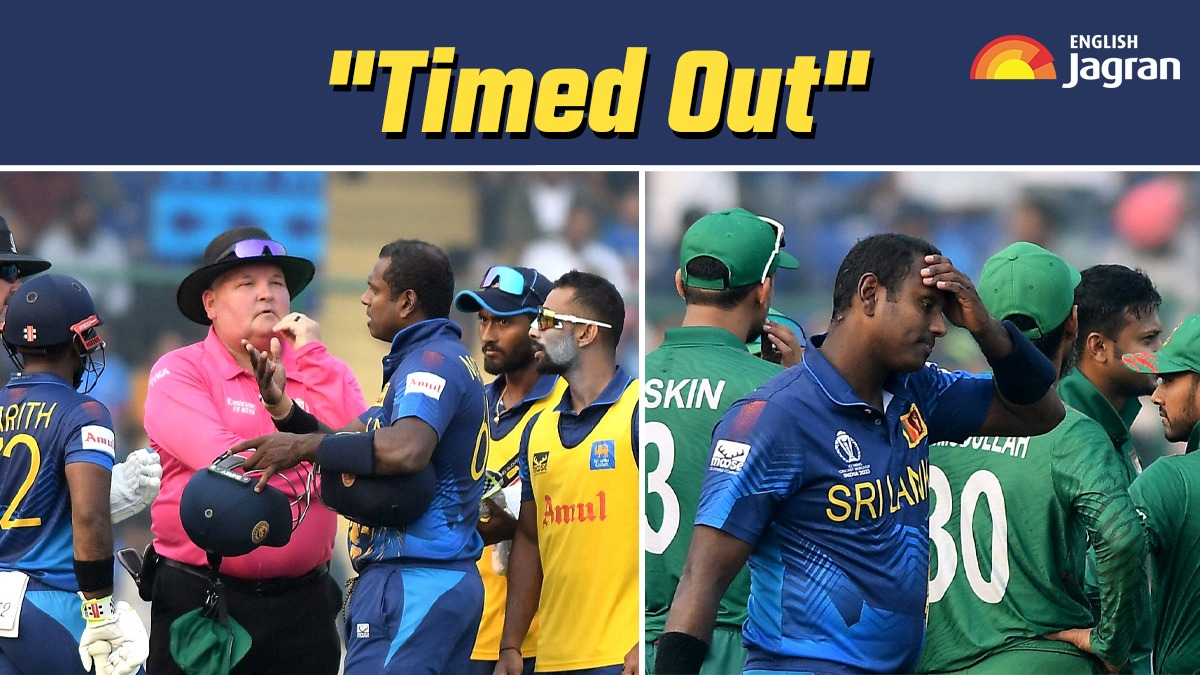- By Manik Sharma
- Mon, 06 Nov 2023 07:01 PM (IST)
- Source:JND
In an extraordinary turn of events during the Sri Lanka vs Bangladesh Cricket World Cup 2023 clash at the Arun Jaitley Stadium in Delhi on November 6, the Sri Lankan all-rounder Angelo Mathews etched his name into cricket history for all the wrong reasons. He became the first international cricketer to be dismissed under the 'timed out' rule.
What is 'Timed Out'?
The 'timed out' rule, which stipulates that the incoming batsman must be ready to receive the ball within a specific time frame (two minutes) after a wicket falls or a batter retires, has been in place in ODI cricket since June 2023. The time limits vary across different formats of the game, with three minutes for Tests and 90 seconds for T20Is.
What Does the Rule Say?
LAW 40.1-TIMED OUT according to Marylebone Cricket Club (MCC):
"After the fall of a wicket or the retirement of a batter, the incoming batter must, unless Time has been called, be ready to receive the ball, or for the other batter to be ready to receive the next ball within 3 minutes of the dismissal or retirement. If this requirement is not met, the incoming batter will be out, Timed out."
LAW 40.1-TIMED OUT according to tournament playing conditions
"Incoming batters are expected to be ready within 120 seconds (2 minutes). If they are late they will be out - Timed out."
Samarawickrama was dismissed at 15:49 local time according to official scorers at the venue whereas Mathews was timed out at 15:54 local time. He walked in at 15:50 local time according to the official scorers, but wasn't ready at the crease within the stipulated time. Mathews' wicket, in accordance with the rule, was not attributed to any bowler.
How It Unraveled?
The incident took place during the 25th over of the match, immediately after the dismissal of Sri Lanka batter Sadeera Samarawickrama. As Mathews was due to take the strike, he encountered some issues with his helmet strap and signalled for a replacement. It was at this moment that Bangladesh skipper Shakib Al Hasan made a game-changing appeal for a 'time out.'
Despite Mathews' attempts to explain the situation to both the umpires and Shakib, the rules governing 'timed out' were followed, and Bangladesh decided not to withdraw their appeal. Consequently, Mathews had to leave the field without facing a single delivery.
History
The incident in the World Cup match is the seventh occurrence of a 'timed out' dismissal in men's cricket. It is the first time such a dismissal has happened in 50-over cricket.
The previous six instances all took place in first-class domestic cricket, with one notable case involving Hemulal Yadav during a match between Tripura and Orissa in 1997.
What Next?
While cricket enthusiasts may rarely witness a 'timed out' dismissal, this incident serves as a testament to the sport's depth of rules and regulations. Angelo Mathews' name will forever be associated with this rare dismissal method, marking a significant moment.
Bangladesh's skipper, Shakib, will also be remembered for remaining adamant to not withdraw the controversial call. The umpires Marais Erasmus and Richard Illingworth consulted Shakib to confirm his decision, and the star all-rounder affirmed it with a historic nod.
